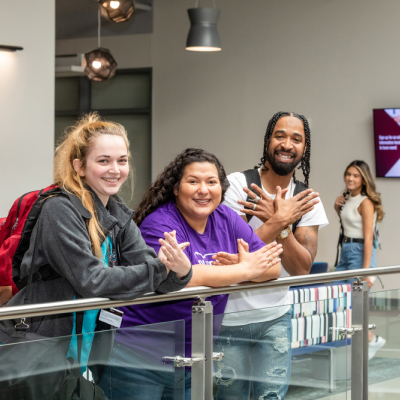For many students who seek an associate or bachelor’s degree, paying for college can feel out of reach. Even at Austin Community College, where tuition and fees are considerably lower than other colleges and universities (and even free for eligible students), the financial barriers can seem insurmountable.
But with some planning and research, you can invest in your future without being overwhelmed by debt.
Here’s how to make paying for college more affordable.
Tip 1. Apply for Financial Aid
Filling out the FAFSA is the first step in paying for college. The Free Application for Federal Student Aid (FAFSA) opens every October 1. You can apply year round for every year you’re in school.
The FAFSA is an all-in-one application. Complete and submit to apply for three types of aid – grants (free money), loans (borrowed money), and work-study (part-time work).
Note 1: Financial aid can cover more than just tuition; it can cover any life expenses too like housing, food, and day-to-day living. That’s why, even if you’re eligible for ACC Free Tuition, you should also fill out the FAFSA to cover all your expenses.
Note 2: You can apply for financial aid year round. However, the closer you apply to October 1, the better. You’re more likely to get the most available aid if you apply at the beginning of the season. This is especially important if you’re eligible for a Pell Grant (see below).
What can the financial aid package include?
Pell Grants and Other Grants
The first thing to know about Pell Grants and other grants is this: grants are not loans. They do not have to be repaid.

The federal government awards Pell Grants to undergraduate students based on financial need (determined by the FAFSA). The maximum amount for 2024-2025 was $7,395. Pell Grants can be used to pay tuition, transportation to and from school, housing costs, textbooks, and more.
While Pell Grants are available year-round, state-specific grants in Texas, such as the Texas Public Educational Grant (TPEG), may have limited funds, so early application is crucial.
This is why you should fill out the FAFSA as close to October 1 as possible. If you are eligible for a Pell Grant or other grants offered at ACC, you want to make sure that you can get the maximum amount of aid.
Eligibility for these grants starts with – you guessed it – filling out the FAFSA.
Student Loans
Student loans are a reality for most students. These loans are an investment in your education. However, since loans have to be repaid whether you finish your degree program or not, it’s important to be careful in how much you borrow.
Federal student loans offer the best terms and interest rates. If you do have to take out a private (non-government) student loan, make sure you’re aware of interest rates and repayment deadlines.
Work Study
Work study is part of a student financial aid package. Students who are eligible for work study can work up to a certain number of hours at ACC or specific community partners, depending on the amount of the award.
Why participate in federal financial aid work study programs?
- Extra money. Work study wages can be used for every day expenses, and the income doesn’t count against you for your financial aid.
- Convenience. Many work study jobs are on campus, so you can combine your school and work commutes.
- Type of work. Like internships, work study jobs are often connected to your degree field, so you can potentially get experience in your field.
- Flexibility. Work study hours tend to be 10 to 19 hours per week with flexible hours. Other part-time jobs may have required hours, making it hard to balance school and work.
ACC’s financial aid office can help you through the process of applying for jobs once you have your work study award. And our career services team can also help guide you in your job search using our career services resources.
Tip 2. Apply for Scholarships
Like grants, scholarships do not have to be repaid. While some scholarships are based on grades (merit scholarships) or financial need (needs-based scholarships), many others are based on cultural, community, or other factors.
The award value of scholarships varies, from all tuition paid to small amounts. But even a $200 scholarship is worth it. Not only is there an ego boost to knowing that someone out there supports you, that $200 can be put toward gas money or textbooks.
It might seem daunting to apply for scholarships, especially when you have to write an essay. Fortunately, ACC makes the scholarship application process a breeze, with one application that auto-matches you with hundreds of scholarship opportunities. Even better, ACC has student support specialists who can help you craft an essay that will tell scholarship committees why you deserve their support.
Tip 3. Look into Employer Tuition Assistance
Whether you are a traditional college student (high school graduate going directly to college in the fall) or a non-traditional student, you may be eligible for tuition assistance from your work. Many large corporations including Amazon, Starbucks, and Chipotle will reimburse all or part of their workers’ college tuition, including for part-time employees.
Some companies put conditions on their reimbursements, such as limiting degrees to industry-specific programs, such as business or hospitality, or to specific partner schools.
Ask your company if they offer tuition assistance and find out if you’re eligible.
Tip 4. Seek Aid that Helps
There are many more costs of a college education beyond tuition and fees. Housing, food, and transportation all add up, even if you live with parents or family. If you’re going to college, you may be working less, which puts pressure on paying rent, buying groceries, or putting gas in the car.
Financial aid through the FAFSA can help with these college expenses, and ACC offers so much more.
ACC offers a variety of student support services like child care vouchers, a Green Pass with Capital Metro, food pantries, and more that can be added on top of financial aid to help you succeed.
We want you to take advantage of these other resources that can help with living and other expenses, so you can focus on your studies.
Student Emergency Fund
Emergencies happen. Whether that’s a flat tire, an unexpected co-pay, or job loss, a sudden emergency can delay or even halt college plans.
That’s when the ACC Student Emergency Fund can help.
Students can turn to the emergency fund to help with these and many other disasters.
Setbacks can feel demoralizing and make you want to give up. The emergency fund is there to give you hope and help you get back on your feet so you can meet your goals.
Tuition Payment Plans
Set up an interest-free tuition payment plan and you can divide your payments into three installments (two installments for summer courses). This can ease the financial burden of paying college. As with any installment plan, it’s important to keep up with payments, but a monthly budget can help with planning for those payments.
Speaking of budgets, ACC’s Student Money Management Office can help you set one up. When your income is low or inconsistent, you may ask, how can a budget help? The Money Management Office can give you the tools to help you control your money. A financial education is just as important as academics and job training.
Food Security
Every ACC campus has a Riverbat Bites food pantry where students can “shop” for staples like canned foods, pasta, bread, and more. Some pantries even have fresh foods like milk, vegetables, and fruit.
These services are just as much a part of your academic journey as your classes, advising, and technology support. Use them as you would any other resource.
Technology and Internet Access
Technology is essential to the modern classroom, whether you’re taking classes online or in-person. ACC makes sure that students have the tools they need to succeed. You can borrow iPads, webcams, mics, and other tech so you can participate in class, write papers, do group projects, and more.
Each campus has a library with computer stations, and many campuses have a learning lab or ACCelerator, which offer a wide variety of student technology and support services. Students can go to any ACCelerator on any campus to access services.
Transportation (Green Pass)
ACC students can get free bus and rail access with the Capital Metro Green Pass, which can help with transportation to and from classes, work, and wherever else you need to travel. The Green Pass is free – just sign up for it each year, and you’re good to go.
Paying for College – You Got This!
College costs may feel daunting, but you can do it. Start with the FAFSA. Apply for scholarships. See if your employer has tuition assistance, and finally, ask for help. From emergency funds to advising to tutoring and more, ACC support services are here for you. Learn more about Austin Community College and let us help you meet your goals.
